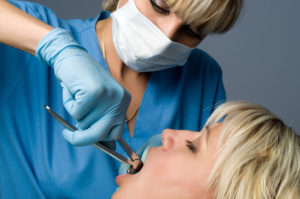Hearing the dentist say, “The tooth needs to be extracted” is not exactly enjoyable news to receive. In fact, it may bring about feelings of dread, sadness, and even fear. Although most dentists will try and save a tooth through conservative treatments first, there are times when a tooth is too far damaged and must be extracted in order to protect the health of your entire smile. When a diseased tooth is left for too long, the infection can spread to nearby teeth, causing further tooth decay and increase your risk for gum disease. An oral infection can even affect your overall health. According to the American Dental Association, your oral and physical health are correlated. When an oral infection is present, it can result in the development of chronic inflammation, diabetes, and exacerbate heart conditions.
Our doctors can perform a comfortable and inexpensive tooth extraction at our Lithia Springs, GA practice. To learn more, call us today at 770- 489-9141 or request an appointment online.
Reasons for a Tooth Extraction
Severe tooth decay, infection, and gum disease are the primary reasons for an extraction. However, the doctor may also recommend an extraction if the roots of a tooth are too damaged to be treated with root canal treatment. If you are missing most of your teeth and considering dentures, the doctor may go ahead and remove any remaining teeth to make sure your restoration fits appropriately. Tooth extractions are often recommended to prepare the mouth for orthodontics when there is not adequate spacing to shift teeth into alignment or baby teeth have failed to fall out on their own.
How Are Tooth Extractions Performed?
They key to any successful tooth extraction is making sure the patient is comfortable. Our doctors at Value Smiles offer multiple sedation dentistry options, including nitrous oxide to help your mind and body relax throughout the entire procedure. To optimize your comfort, a local anesthetic will be given to numb the tooth and surrounding area.
Once the doctor is sure you are relaxed and comfortable, he will use an instrument known as an elevator to loosen the tooth from the socket. He will then use small forceps to grasp the tooth from the crown. After rocking it back and forth, he will gently lift it from the socket and immediately apply gauze and pressure to slow any bleeding. This helps the socket form a blood clot. If necessary, small sutures may be placed to close the gap.
Tips for Achieving a Smooth Recovery
Depending on the level of sedation used, you may need to arrange for a loved one to pick you up. Before leaving, you will be given a list of instructions to follow to ensure you achieve a smooth recovery. These instructions will include certain tips, such as:
- Medications to take. While over-the-counter pain relievers can usually eliminate any discomfort, you may be required to take antibiotics to treat any infection.
- Caring for the surgical site: You will be instructed to rinse with either saltwater or a special mouthwash to keep the area clean and free from infection. Maintaining usual oral hygiene of brushing twice daily and flossing are also important, just use gentle techniques.
- Foods to avoid. For the first few days, it is best to avoid chewing on the side of the mouth where the extraction took place and to maintain a soft foods diet. Avoiding crunchy, spicy, and hot foods can also help minimize any irritation.
- Attend follow-up appointments. Be sure and attend any scheduled follow-up appointments so the doctor can monitor your recovery.
Schedule Your Consultation
If lack of insurance or cost is a concern, we offer tooth extractions for $139 – $169. Contact us today for more details or to schedule your consultation with one of our skilled dentists.


